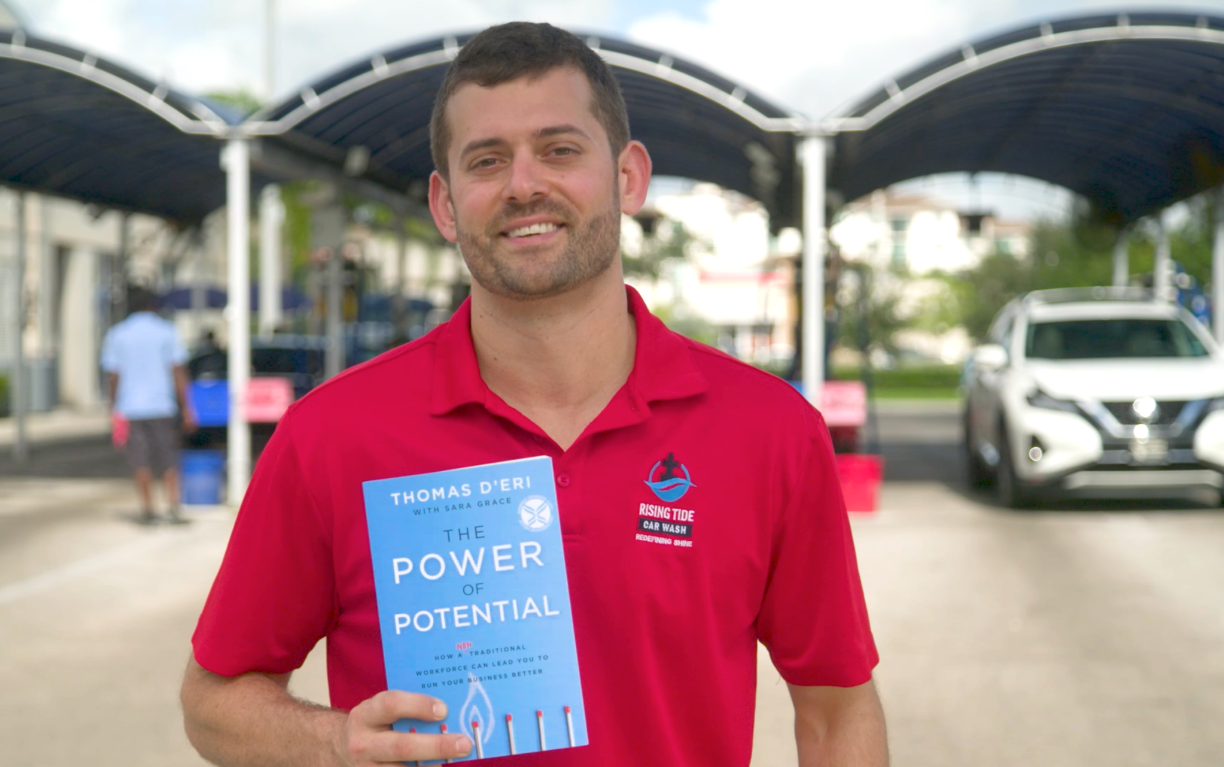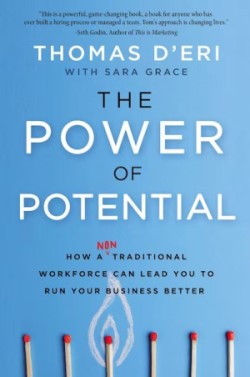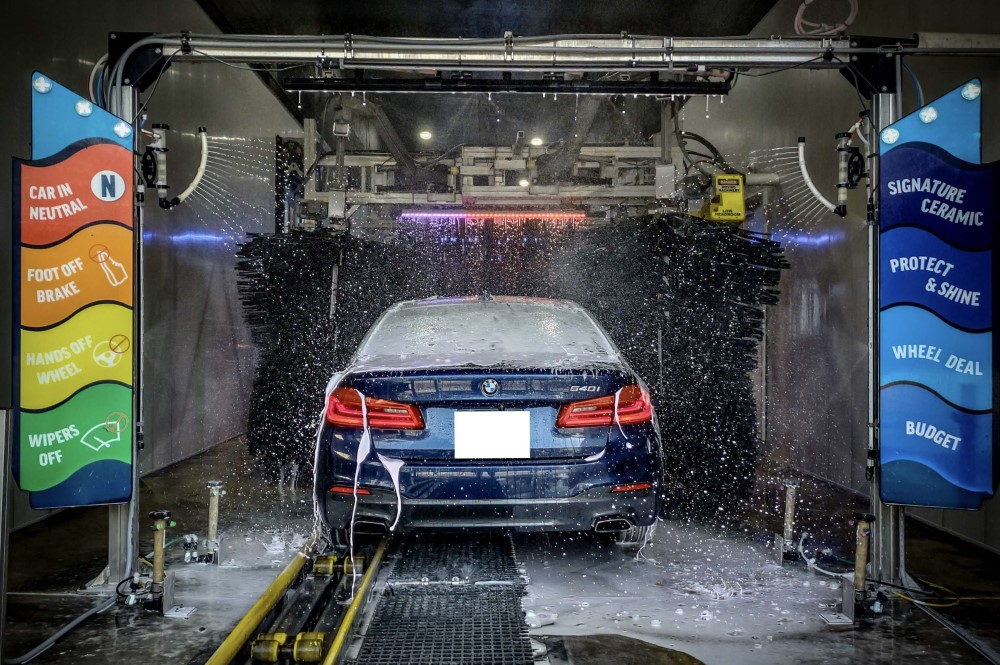
The Advantages of Autism
When Tom D’Eri ’11 and his father were choosing a name for their South Florida-based car wash in 2013, they found inspiration in a popular saying often attributed to John F. Kennedy: “A rising tide lifts all boats.”
The decision to name their company Rising Tide Car Wash proved prescient: a social enterprise, Rising Tide is dedicated to hiring people with autism** — and as D’Eri, its co-founder and COO, explains in his new book, “The Power of Potential,” designing systems and processes based upon the unique needs and abilities of neurodivergent employees has helped the company “create a truly inclusive work environment that empowers everyone.”

D’Eri hopes the book will inspire other business leaders to “leverage neurodivergent talent to transform their companies for the better.” After all, Rising Tide’s success offers a compelling case study: In 2012, the year before the D’Eri family bought a struggling car wash in Parkland, Florida, the business serviced just 35,000 vehicles a year; in 2021, under their management and with a nontraditional workforce, they cleaned more than 170,000 cars.
In the 10 years Rising Tide has been in business, the D’Eri family has opened two additional Florida locations, been interviewed by “NBC Nightly News” and “Today,” and appeared in Inc. magazine and as a cover story in Entrepreneur. D’Eri — who in 2019 was recognized on Forbes’ 30 Under 30 list of successful social entrepreneurs — also notes that “people fly in from other states and rent cars when they land just so they can experience Rising Tide for themselves.”
Although he’s grateful that Rising Tide is profitable, D’Eri is justifiably prouder of creating a business that provides “satisfying, sustainable employment” for people with autism. “We didn’t succeed despite our nontraditional workforce — we succeeded because of it,” he emphasizes. “Our whole business model is based on hiring individuals who others overlook as talent and empowering them to become rock star employees.” In the process, he adds, “we’ve transformed a failing car wash into a high-performing service organization that customers love to support and employees love to work for.”
RELATED: Why DEI matters more than ever for American companies
D’Eri’s younger brother, Andrew, who has autism, provided the impetus for launching Rising Tide. As Andrew’s high school graduation neared in 2009, the D’Eri family wondered what would come next. “Society can be more disabling to people with autism than the condition itself,” D’Eri observes, noting that, of the 5.6 million autistic adults in America, an estimated 50-75% are unemployed or underemployed. Wanting a more fulfilling future for Andrew, D’Eri and his father decided to create a business that would allow Andrew and others with autism to “experience the dignity of earning a living and finding a community where they feel confident they are exactly enough.”
In 2011, D’Eri graduated summa cum laude from Bentley with a double major in Economics-Finance and Liberal Studies: Earth, Environment and Global Sustainability. A sustainability course during his first semester “really opened my eyes to the possibility that business could be a force for good,” he explains, and he’d left campus determined to pursue a career in environmental sustainability consulting.
Initially, D’Eri says, the pivot to social entrepreneurship felt daunting. But the knowledge and skills he acquired at Bentley provided a firm foundation for Rising Tide’s success. “Most social entrepreneurs fail because they don’t have a rigorous business background,” D’Eri explains. “But Bentley taught me that businesses have to be healthy to have an impact. The ability to develop a strong, sustainable and scalable business model becomes second nature with a Bentley education.”

D’Eri and his father devoted a full year to researching and networking before they felt confident in their vision for Rising Tide, meeting with corporate disability consultants, special education teachers and faculty experts from the University of Miami Center for Autism and Related Disabilities to learn how to create a work environment where employees with autism could thrive.
This was no easy undertaking, as autism spectrum disorder (ASD) is a complex neurological condition that affects individuals in different ways. In addition to challenges with communication and social interaction, many people with autism have additional medical conditions, such as learning disabilities and mental health disorders. But instead of viewing these differences as disadvantages, D’Eri says employers should “think of the autism perspective as the canary in the coal mine. Employees with autism push all the systems they interact with to be clear, focused on concrete results and streamlined,” he says, which ultimately helps business owners find — and fix — existing flaws in their operating systems.
In “The Power of Potential,” D’Eri shares specific examples of how Rising Tide leveraged the needs of its neurodivergent workforce as business advantages. One is the hiring process. Instead of traditional interviews, where candidates are evaluated on criteria including their resume, GPA, alma mater and social skills, Rising Tide created a pre-hire training program to “audition” potential employees.
“Our applicants with autism often don’t have work histories, and many have nonstandard employment backgrounds,” D’Eri explains, so Rising Tide offers potential employees the opportunity to clean actual cars in a working car wash. (All candidates are compensated for their time.) “This allows us to see, in real time, if the candidate is able to follow directions, has the physical ability to do the job and is comfortable in the work environment.” As he sees it, “The best way to find out whether someone will perform in your business is to put them to work in your business.”

Rising Tide has also implemented visual systems and checklists to eliminate ambiguity and clarify expectations in the work environment. For example, every tool storage bin includes a picture of the object denoting how it should be put away and the minimum number of items required to be there. D’Eri observes that relying on images instead of words to streamline the production process is particularly helpful for people with autism, who often struggle with reading, but can also benefit neurotypical employees with limited English proficiency.
Similarly, Rising Tide uses touch screen order-taking machines that allow customers to select and pre-pay for services. These machines not only make it easier for neurodivergent employees to greet and interact with customers, he says, but also “make the purchase process clearer and less intimidating for the customer — yet another example of how designing for people with autism leads to better results for everyone.”
Ultimately, D’Eri says, “When a company lets every employee know that diversity is valued, and that different is not ‘less,’ it changes how people treat one another.” What’s more, by fostering an awareness of and appreciation for neurodivergence, business leaders can become powerful agents of positive social change. As he puts it: “Every new customer we serve at Rising Tide is an opportunity to change attitudes and fight prejudice surrounding autism.”
** A note about terminology: Some members of the autism community prefer to use identity-first language (“autistic people”) instead of person-first language (“people with autism”). As D’Eri explains, “We polled our employees, and they chose people with autism (rather than autistic people), which we adopted as the language of this book.”

